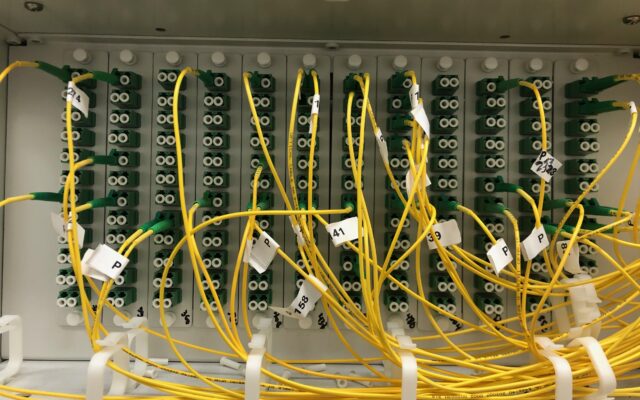
Broadband coalition looks to get the region connected
DOVER-FOXCROFT — Earlier this year town officials and residents in and around Piscataquis and Penobscot counties formed a broadband coalition to deal with ongoing poor internet connectivity. The group is now organizing to find funding services, a provider(s) and ways to share everything it does with the community.
So far the towns of Corinna, Dover-Foxcroft, Dexter, Garland, Guilford and Milo have signed on to the Maine Highlands Broadband Coalition to craft solutions to bring affordable and reliable internet to all residents and businesses in the area. Other communities have expressed interest in the non-binding coalition and group members hope to involve as many of the two dozen other towns in the region as possible.
Communities that join in will have stronger negotiating power with providers and a better chance at winning grants and other funding.
The coalition held its first working meeting at the Morton Avenue Municipal Building on June 7. The session started the process to come up with ideas for broadband and develop a timeline, Chris Maas, a Dover-Foxcroft resident leading the effort, told the attendees representing various towns, regional economic/business organizations, state broadband programs and the Office of U.S. Sen. Susan Collins.
In December, a $60,000 broadband planning study that presented fiber as the only option to implement broadband countywide was released. “I picked it up and read it and said ‘we ought to be doing something with this,’” said Maas, who serves on the Dover-Foxcroft Planning Board and Climate Action Advisory Committee.
He said there would be two basic phases for a broadband project. The first “gets a contract arrangement with some provider, no matter how it shapes up.” He said the next phase would be to implement the contract, no matter how long it takes.
An executive committee, composed of town managers and others, would oversee the process. Dover-Foxcroft Town Manager jack Clukey and Dexter Town Manager Trampas King will set up the committee structure — such as naming a chairperson and co-chairperson — in the near future.
“A big piece of what this is ultimately going to be about is digital literacy,” Maas said, as improved internet access will help connect more people and they will learn how to access services such as telehealth.
Clara McCool of the Maine Broadband Coalition, who is the regional broadband coordinator for the Greater Portland Council of Governments, gave a “Broadband 101” presentation for those attending.
She said improving internet connectivity is a priority because this has become increasingly important for employment and economic opportunities. She said broadband is important for education — evident when some students had poor or no access during remote learning — healthcare with telemedicine, and social ties and civic engagement such as registering to vote online and attending remote public meetings.
McCool said broadband is a standard “defined as internet speeds greater than 25 (megabits per second) download; 3 mbps upload.” She said Maine’s standard is a symmetrical speed 100/100 download and upload split and unserved areas are defined as 50/10.
The rural nature of the state poses challenges for providers, McCool said. She said extensions of service would need to be financially beneficial for the company.
Identifying some terms McCool said a digital subscriber line or DSL is “internet transferred over telephone lines.” Cable internet uses TV infrastructure, with fiber data connected to light travels across glass spindles.
She said fiber “is the gold standard for broadband. You get the fastest and most reliable speeds.”
With fixed wireless internet data is transmitted from a cell tower and radiated out to users. McCool said this is cheaper to install but can be less reliable due to Maine’s geography. There is also satellite internet in which data is transmitted from the orbiting infrastructure to the end user.
McCool said there are three A’s of broadband: accessibility, affordability and accessibility. “You want to be thinking about these during the whole process,” she said.
There are different types of broadband setups including internet service provider owned and operated, municipal owned and provider operated, municipal owned and operated and a regional utility.
Maas said the study from late 2021 — pursued by the Piscataquis County Economic Development Council in which consulting firm Casco Bay Advisors assessed broadband infrastructure throughout the county and suggested solutions — identified 13,000 sites across the region with 5,400 of these not adequately covered by internet. Another 660-plus locations are entirely off the grid. “How much do we want to cover,” he asked.
A questionnaire for prospective providers has been developed and will be shared as the coalition work progresses.
Soon the Maine Highlands Broadband Coalition will need to start working on identifying and applying for funding sources, such as federal dollars available through the Maine Connect Authority. He said many grants are predicated on matches but what form matches take can vary greatly and this does not necessarily require allocating new monies.
Grants will also be influenced by speed tests, which can be done through the Maine Broadband Coalition at https://www.mainebroadbandcoalition.org/speed-test-info.
In the Blue Hill area, an effort similar to what the Maine Highlands Broadband Coalition hopes to accomplish is underway. Maas said the Blue Hill Peninsula group has been very open about its effort, putting information online for everyone to see.
He said a local website will be up and running soon, and this would involve local libraries, schools, businesses and governments.
The Piscataquis Observer’s Valerie Royzman contributed to this story.